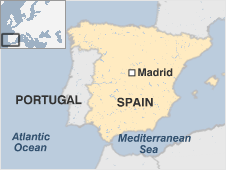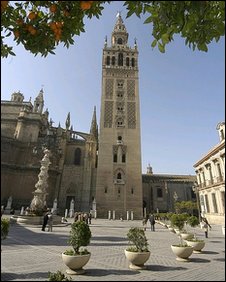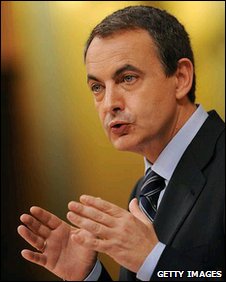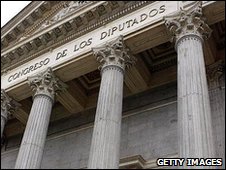Generic Medicines
Taj Pharma is the largest generic pharmaceutical company in India. We hold top positions in different established markets worldwide generics markets..
Located at the crossroads of the Atlantic and the Mediterranean Europe and Africa Spain's history and culture are made up of a rich mix of diverse elements.
 |
Through exploration and conquest Spain became a world power in the 16th century and it maintained a vast overseas empire
until the early 19th century.
Spain's modern history is marked by the bitterly fought Spanish Civil War of 1936-39 and the ensuing 36-year dictatorship of General Francisco Franco.
After Franco's death in 1975 Spain made the transition to a democratic state and built a successful economy with King Juan Carlos as head of state.
The constitution of 1978 enshrines respect for linguistic and cultural diversity within a united Spain. The country is divided into 17 regions which all have their own directly elected authorities.

The Giralda Seville: Remnant of a mosque that once stood on the site
|
The level of autonomy afforded to each region is far from uniform. For example Catalonia the Basque Country and Galicia have special status with their own language and other rights.
Andalucia Navarre Valencia and the Canaries in turn have more extensive powers than some other regions. Asturias and Aragon have taken steps to consolidate language rights.
In 2006 a Catalan referendum backed by the central government gave the region greater autonomy.
The Catalans won nation status within Spain and the region's parliament gained extra powers in taxation and judicial matters. The country's regional picture is a complex and evolving one.
One of Spain's most serious domestic issues has been tension in the northern Basque region. A violent campaign by the Basque separatist group ETA has led to nearly 850 deaths over the past four decades.
Eta declared a ceasefire in March 2006 saying it wished to see the start of a democratic process for the Basque region. The move divided opinion in Spain.
Tentative moves to negotiate a lasting peace were dealt a blow when Eta carried out a deadly bomb attack at Madrid's international airport at the end of the year.
On 6 June 2007 Eta announced the end of its ceasefire saying that "minimum conditions for continuing negotiations do not exist."
Spain shares the Iberian peninsula with Portugal and its territory includes the Balearic Islands the Canary Islands and two North African enclaves.
From Velazquez in the seventeenth century through Goya straddling the eighteenth and nineteenth to Picasso in the twentieth Spain has the proudest of traditions in art.
Flamenco music and dance are widely admired around the world while Cervantes' novel Don Quixote is one of the most popular ever written.
Cinema is much loved and the films of directors such as Pedro Almodovar attract huge audiences.
Head of state: King Juan Carlos I
Spaniards honour King Juan Carlos for ensuring the country's transition to democracy after the death of the former dictator General Franco and for saving Spain from a coup attempt in 1981.
Prime minister: Jose Luis Rodriguez Zapatero
Jose Luis Rodriguez Zapatero who has been in office since 2004 led his governing Socialist Workers' Party to another victory in elections in March 2008.

Prime Minister Zapatero made counter-terrorism a priority
|
The party won by an increased margin but fell just short of an absolute majority.
The Socialist Workers' Party won a surprise election victory over Jose Maria Aznar's conservative Popular Party in March 2004. Polling was overshadowed by a series of explosions on Madrid commuter trains in which 191 people died just days beforehand.
Mr Zapatero is considered to have won the elections because of voter anger over the conservative government's insistence that armed separatist group Eta was behind the blasts despite the evidence pointing to Islamist extremists.
Following his election victory Mr Zapatero described both the war and the occupation of Iraq as a "huge disaster" and pulled Spain's 1300 troops out of the country.
He showed confidence that the Basque separatist group Eta was serious about the ceasefire it declared in March 2006 when he indicated a few months later that he would start talks with the organisation.
But in early 2007 after an Eta bomb attack at Madrid airport he apologised to the nation for having pinned hopes on peace talks with the group. Eta withdrew its ceasefire in June.

Neo-classical facade of the Congress of Deputies the lower house
|
The prime minister supported the process by which Catalonia won greater autonomy at a referendum in June 2006.
Mr Zapatero was born in 1960. His grandfather a Republican army officer was shot dead during the Civil War. He studied law but his career has been largely devoted to politics.
He joined the Socialist Party while still in his teens and first entered parliament at 26. He became party leader in 2000.
He is married and has two daughters.
Broadcasting in Spain has witnessed a spectacular expansion in recent years with the emergence of new commercial operators and the launch of digital services.
The cable and satellite TV markets are growing steadily and a free-to-air digital terrestrial TV (DTT) service was relaunched in late 2005. Spain aims to switch off the analogue TV signal by 2019.
Home-produced dramas reality shows and long-running "telenovelas" are staple fare on primetime TV.
Public radio and TV are run by RadioTelevision Espanola (RTVE) which is funded by advertising and state subsidies. As well as public and commercial national TV networks there are 13 regional stations backed by regional governments and many local stations.
Multichannel TV is offered by the satellite platform Digital Plus.
In spite of the proliferation of print and broadcast media and their diverse political stances concerns have been raised about political influence in the media and particularly in public broadcasting.
The press
Television
Radio
News agencies
Colpisa - private
AFRICA | ASIA-PACIFIC | AMERICAS | EUROPE | MIDDLEEAST | SOUTHASIA
![]()
![]()
![]()
Mauritania Mauritius Morocco Mozambique Namibia Niger Nigeria Republic-of-congo Rwanda Sao-tome-and-principe Senegal Seychelles Sierra-leone Somalia South-africa Sudan Swaziland Tanzania The-gambia Togo Tunisia Uganda Australia Brunei Burma Cambodia China East-timor Fiji Indonesia Japan Kazakhstan Kiribati Kyrgyzstan Laos Malaysia Marshall-islands Micronesia Mongolia Nauru New-zealand North-korea Palau Papua-new-guinea Samoa Singapore Solomon-islands South-korea Taiwan Tajikistan Thailand The-philippines Tonga Turkmenistan Tuvalu Uzbekistan Vanuatu Vietnam Antigua-and-barbuda Belize Bolivia Brazil Canada Chile Colombia Costa-rica Cuba Dominica Dominican-republic Ecuador El-salvador Grenada Guatemala Guyana Haiti Honduras Jamaica Mexico Nicaragua St-kitts-and-nevis St-lucia Suriname Trinidad-and-tobago Uruguay Venezuela Albania Andorra Armenia Austria Azerbaijan Belarus Belgium Bosnia-hercegovina Bulgaria Croatia Cyprus Czech-republic Denmark Estonia Finland France Georgia Germany Greece Hungary Iceland Ireland Italy Latvia Liechtenstein Lithuania Luxembourg Macedonia Malta Moldova Monaco Montenegro Norway Poland Portugal Russia San-marino Serbia Slovakia Slovenia Spain Sweden Algeria Egypt Iran Iraq Israel-and-palestinian-territories Jordan Kuwait Lebanon Libya Mauritania Oman Saudi-arabia Sudan Syria Tunisia United-arab-emirates Yemen Afghanistan Bangladesh Bhutan India Nepal Pakistan Sri-Lanka The-Maldive